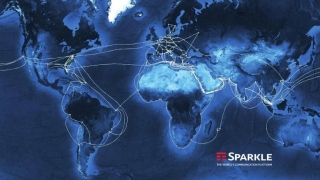AI is reshaping industries globally, and Africa is no exception. From healthcare to agriculture, the promise for AI to drive innovation on the continent is vast, but so are the challenges.
Efua Abasewah Dougan, a Data Strategy & Analytics Consultant at DS Consortium for Information Technology Consultants, believes that in a rapidly evolving technological landscape, the factors needed to foster AI adoption in Africa are robust digital infrastructure, skilled human capital, and stringent data governance.
Subscribe today for free
Strengthening Digital Infrastructure for AI Readiness
According to Dougan, one of the key pillars of AI readiness is strong digital infrastructure. “Without the right infrastructure, advancements in AI will struggle to thrive”, she asserts.
In recent years, some African countries like Ghana and Kenya have made strides toward digitalisation. However, significant infrastructure gaps remain, particularly in terms of broadband access and reliable internet connectivity, highlighting the digital divide in many parts of the continent. She acknowledges and emphasises that “Investments in terrestrial fibre optic network and satellite options are crucial to ensuring coverage in underserved areas”.
On this point, Dougan is adamant about the role of public-private partnerships in driving Africa’s AI readiness; “Government alone cannot do it all,” she says, acknowledging the financial constraints many African governments face when it comes to large-scale infrastructure projects.
She believes PPPs have been a powerful mechanism for driving infrastructure development and enabling the transformation journey of several African economies into a digital ecosystem. “Institutions like the World Bank, African Development Bank, and platforms like the Africa50 Infrastructure Investment have been instrumental in this regard, but more needs to be done to involve local partners and investors”, she notes.
She further highlights the importance of educating local investors and policymakers on the commercial value of AI and digital infrastructure, noting this as a solution to some investors who might dismiss infrastructure investments like data centres as “just big fridges”. This, she insists, is crucial to unlock new investment opportunities and foster innovation, she explains.
The recent West Africa and Red Sea cable cuts from earlier this year, which had a massive impact on internet connectivity across Africa, serve as a reminder of the continent’s vulnerability. Dougan reflects, “What we learned from these submarine cable cuts is the need for us to invest in redundant and disaster recovery systems in our infrastructure plans; this will help build resilient networks that can withstand such disruptions in the future”.
Despite these hurdles, Dougan remains optimistic about Africa’s ability to catch up with more technologically advanced regions but is realistic about the challenges.
Developing Human Capital to Power the AI Revolution
Building a robust infrastructure is only one part, and to fully realise the potential of AI, a skilled workforce ready to drive AI innovation is crucial for our AI readiness.
Dougan emphasises further the urgent need to develop human capital as another cornerstone of Africa’s AI readiness. “Upskilling and reskilling the workforce is essential,” she notes, advocating for a closer alignment between academia, the private sector, and the government.
Educational institutions must align and update their curriculums to reflect the evolving and emerging demands of AI technologies, ensuring that the current workforce and upcoming generation are equipped with the right skills that will be in demand when AI becomes mainstream across Africa. Dougan points to the role of DS Consortium’s training programmes, which are curated to bridge the skills gap and prepare the next generation of IT and data management professionals. “Our collaborations with educational institutions and organisations aim to create a talent pipeline that will fuel the AI revolution in Africa”.
Bridging the Gaps in Data Accessibility and Governance
While human capital development lays a strong foundation for AI adoption, the effectiveness of these efforts is contingent on the availability and accessibility of quality data. Therefore, the focus must also be on bridging the gaps in data accessibility and governance.
In her work with the DS Consortium for Information Technology Consultants, Dougan is part of a broader effort to bridge these gaps. “We provide advisory and training services to governments and industries on leveraging data governance, data quality management, and analytics to ensure they are prepared for AI technologies,” she says. DS Consortium helps businesses optimise their operations through strategic partnerships using data-driven insights and IT and data management strategies, laying the groundwork for future AI adoption.
However, the availability and accessibility of data presents another challenge. Africa, Dougan notes, is rich in data, “but accessing that data - especially for research purposes - can be difficult due to regulatory and infrastructural limitations”. Dougan stresses and advocates for improved data management frameworks, positioning DS Consortium at the forefront of this transformation in developing robust data governance policies that align with international standards. “Our work with various regulatory bodies aims to create a more harmonised data ecosystem to support research, innovation, and growth”.
One of the most pressing issues facing AI adoption globally is data privacy and governance, and Africa is no exception. With the rise of AI technologies, concerns about how data is managed, shared, and protected have grown.
Dougan highlights the uneven adoption of data privacy laws across the continent. “There are only 36 out of 54 African countries that have a quasi-GDPR policy in place today, and this regulatory gap is crucial, especially as AI adoption conversation and initiatives intensify”, she says. She further points to concerns like the misuse of personal data and deep fakes, which highlight the urgency of establishing robust privacy and governance laws in all countries.
She also observes that “an integrated, continent-wide framework is also lacking” And calls for swift action by all stakeholders to move from fragmented national regulations to a unified regional framework, focusing on integrating data privacy and governance policies to spearhead collaborative growth and ensure trust in these technologies. DS Consortium is actively involved in advocacy and capacity-building efforts to advance these regulatory developments.
The Future of AI in Africa
As we address these pressing regulatory and governance challenges, it is also important to look ahead, and Dougan envisions AI and Data Analytics playing a big role in this regard. From identifying network bottlenecks to optimising telecom services and improving connectivity across the continent, the data-driven insights derived can help inform better decision-making and drive operational efficiency. “There’s so much that analytics can do to improve connectivity,” she affirms. DS Consortium’s analytics solutions are tailored to help organisations identify opportunities for growth and efficiency, positioning them to thrive in the evolving digital landscape.
Dougan and her team at DS Consortium remain steadfast in their mission: to help African businesses and governments leverage IT and Data solutions to drive growth, efficiency, and, ultimately, readiness for the AI revolution.
“We’re at a critical juncture,” Dougan concludes.
With the right investments in infrastructure, human capital development, and robust governance frameworks, Africa can fully embrace the potential of AI—and we’re committed to making that vision a reality.





